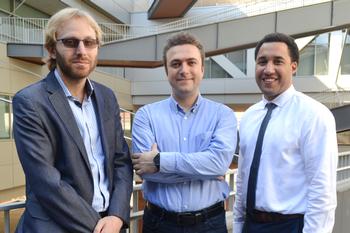New NSF center will help to improve health in underserved communities

TASSA Board member, Aydogan Ozcan is working on new technologies for helping people with low-income, who have diabetes and cardiovascular diseases. Funded by the National Science Foundation (NSG), his team at UCLA is partnering with Texas A&M University, Rice University and Florida International University to establish an Engineering Research Center that is named PATHS-UP, Precise Advanced Technologies and Health Systems for Underserved Populations, which is a large-scale consortium which will receive approximately $40 Million funding over 10 years.
Aydogan Ozcan, Chancellor’s Professor of Electrical and Computer Engineering, is the leader of the PATHS-UP team at UCLA, along with Dino Di Carlo, professor of bioengineering and Omai Garner, professor of pathology and laboratory medicine. “We are very excited to develop wearable and mobile technologies that will help to prevent, delay and better manage diabetes and heart disease,” said Ozcan.
“UCLA Engineering is proud of the PATHS-UP team and committed to developing accessible and affordable health management tools for people who are at risk,” said Jayathi Murthy, Dean of the UCLA Henry Samueli School of Engineering and Applied Science. “With our wealth of expertise in mobile health and diagnostics, UCLA’s schools of engineering and medicine have the resources and talent to make a lasting difference in our surrounding communities.”
“PATHS-UP comprises a team of extraordinarily dedicated researchers who aim to develop cost-effective health care for underserved populations,” said Deborah Jackson, the NSF program director for the initiative. “If PATHS-UP’s chronic disease interventions are successful, they will have tackled a significant source of the skyrocketing national health care cost.”
The technologies UCLA researchers intend to develop will help doctors and patients themselves easily conduct their own health screenings. As part of the project, the team will also develop algorithms to help doctors be more aware of potential long-term complications, so they can advise their patients on diet, medication and lifestyle changes that might help them stay healthier.
“This NSF engineering center will be a catalyst for UCLA to accelerate our excellent research programs at the intersection of engineering and medicine,” said Jeff Miller, director of UCLA’s California NanoSystems Institute. “It will broaden our impact on human health through advanced biomedical technologies.”(*)
(*) http://newsroom.ucla.edu/releases/ucla-engineering-and-medicine-work-for-better-health-in-underserved-communities